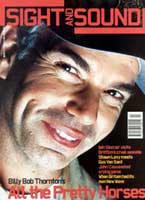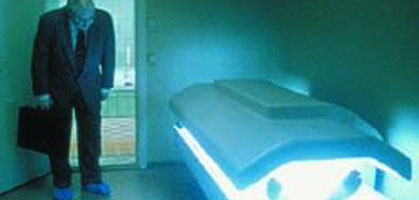
Not waving but drowning
Film of the Month: Songs from the Second Floor

Roy Andersson, the Swedish director ofSongs from the Second Floor, has often referred to the importance of painting as an influence on his style. Interviewed for the Cannes Film Festival edition of Reperages magazine, he likened his worldview to the mix of absurdity and expressionism he admires in the work of such Neue Sachlichkeit painters as Max Beckmann and Otto Dix. At the heart of the New Objectivity in 20s and 30s German painting was a violent social satire whose darkness bears comparison with Lindsay Anderson's uneasy visions of a corrupt and deliquescing Britain in O Lucky Man! (1973) and Britannia Hospital (1982), in particular their concentration on the frailty of any philosophy or faith in the face of a brutally hierarchical society rotten from the top down. But just as the bleakness of Anderson's films was likened by critics to Voltaire and Hogarth, so too they could be accused of exchanging the edifying qualities of satire for little more than misanthropy.
The same criticism could be made of Songs from the Second Floor with its depiction of a featureless mercantile city's collapse into madness and panic as the result of an unexplained economic meltdown. The sickly progress of the city's disintegration is echoed in the descent into paranoia and despair of Kalle (Lars Nordh), a middle-aged furniture salesman who's burned down his business in the hope of cheating on the insurance. Shot in the colours of cold veal, sour milk and sweating mildew, the film's alternately claustrophobic and agoraphobic ambience has the same darkly comic focus on neurasthenia and decay celebrated with such febrile ambivalence in the paintings of Beckmann and Dix. But unlike them, Andersson does not deal in glamour. This is a place as dreary as a military hospital, presided over by a senile commander-in-chief who acknowledges the hundredth-birthday tributes of his high command sitting on a bed pan and asking for his best wishes to be passed to Goering.
Indeed, in many ways the landscapes and denizens of Andersson's first feature since 1975's Giliap seem to have more in common with pre-war nightmare visions of urban collapse from T. S. Eliot's 'The Waste Land' to Brecht's 'The Rise and Fall of the City of Mahagonny' than with contemporary notions of society in extremis. As a result Songs from the Second Floor comes across as strangely archaic, burdened by the issues raised by early-20th-century European modernism through its questioning of God's existence in the light of humankind's self-regarding capitalist greed. This point is condensed in three separate lines of dialogue that could be taken to define the film's broader territory. And in each case the background activity adds a ghoulish humour that mocks a society where madness and despair and the exchange of order for chaos dominate the zeitgeist.
"Life is a market, it's as simple as that," remarks a cynical trader in religious artefacts (imagine one of the embittered real-estate salesmen in Glengarry Glen Ross) as he sits beside his table in a draughty conference hall. And behind him, even as he drawls out his platitudes, one of his Christs has worked loose from its crucifix, swinging by a single nail in an obscene mockery of a sacred symbol.
As the nameless city becomes increasingly caught up in doomsday hysteria (the streets are blocked by an endless, unexplained traffic jam, as if caused by freak weather conditions; processions of wailing citizens, like the doomed sinners in a John Martin painting of Judgment Day, flagellate one another in a choreographed ritual of penitence), it is the collapse of "the market" that seems to have unleashed the apocalypse. All the more terrifying for being so vague - some enormous shift in society's socio-economic foundations - the circumstances shaping the city's decline appear also to be the consequence of a morality that has reached critical mass. One of Kalle's two sons is a patient in a psychiatric hospital: "He wrote poetry until he went nuts," his distressed father repeats to a white-robed man in the corridor who turns out to be a patient in a stolen doctor's coat.
A series of precisely staged tableaux, each filmed in a long take, Songs from the Second Floor's elliptic narrative structure owes something to Andersson's background as a director of award-winning commercials. But there is also a strong sense in which Songs from the Second Floor can be seen as a political broadside against the sheer bulimic force of advanced cultural materialism. The last of the film's three key lines occurs in a poem Kalle's other son recites to his sick brother: "Blessed be the one who sits down" - a plea for a pause, and a peaceful protest against capitalist hysteria.
But without the glamour that's so much a part of the emotional chemistry of the canvases of Dix or George Grosz, Songs from the Second Floor eventually collapses under the weight of its own despair. Towards the end, just after a little girl has been sacrificed (pushed off a cliff) in an attempt to revive the economy (by pleasing some fiscal god, it's implied), comes a scene in which a drunken capitalist vomits over the bar as another struggles to stand up. It's another moment in the spirit of the Neue Sachlichkeit, but somehow it's a brutality too far. It joins with Kalle's earlier experience of being haunted by the ghost of a man to whom he owed money who then killed himself, and the spectre of a Jewish boy hanged along with his sister during World War II who never had time to apologise to her for some nameless wrong. Another shuffle of the deck, you feel, and this could be by Woody Allen.
Songs from the Second Floor is an ideologically ambitious and cleverly stylish film, with many scenes that linger in the mind - like those of David Lynch's Eraserhead or Terry Gilliam's Brazil - thanks to the economic precision of their ability to disturb. But as Kalle's world breaks down and horror is added to horror, the film's purpose - a lugubrious danse macabre stifling hope at every step - appears to drown in its own misery.
